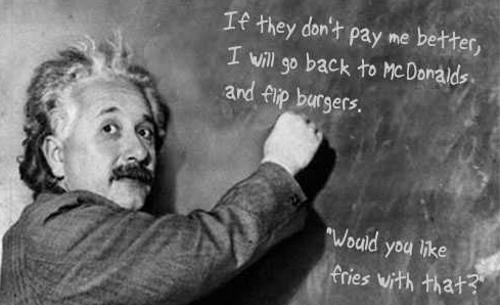Think about your worst times in your career. You were probably stressed by a lot of little things that seemed bigger than they really were, and perhaps some really big challenges, too. Deadlines, coworkers, health, family, finances, and other stressful issues can make it feel like everything is spiraling out of control. Some challenges can be used to build a company stronger, but it is far more common that they become destructive.
I am going to give you a bit of information that you can email to your boss with confidence, tweet on Twitter, “Like” on Facebook, and best of all … you can blame me for being the one who gave your boss this uncommon piece of common sense.
Is there a solution? I have found through more than two decades in business for myself, and from consulting with many businesses, the majority of business challenges can be improved with more money. That could mean hiring a better accountant, bringing in a strategist, improved inventory and purchasing capability, or having the right equipment to do the job at hand. The list of enhancements is long, but let’s just say that money can bring about a lot of improvements in a company.
One of the greatest improvements to a business comes from the quality of life of the people who make the business what it is. You cannot separate the people from the business, and if you try, you will fail!

Think of it like this for a moment: About half of all marriages in America end in a divorce. The two biggest causes that people claim are infidelity and finances. I suspect that much of that infidelity is because they don’t have enough money to have sex with their spouse! Come on, really, how sexy is an unproductive or frustrated spouse, after all?
Yes, sex and money break people down and make them less productive, even in their marriages. So how could it even be possible that this does not affect their business life, too? It is not possible, because businesses are made up of their people. Fragile or strong, focused or fragmented, those people are what make a company whatever it becomes. This is why, as a consultant, I have always suggested investing wisely in the people, and I have recommended as many pay raises as job terminations.
Money Can Help Most Business Challenges
Money does not fix everything, but in a business, it can facilitate a lot of things which are not otherwise possible. If more money can help a business, and I think this is very true for most if not all companies, then how do you make that happen? It generally requires doing more of the business that pays the company profits. That means marketing, and marketing well!
I have been in business long enough to know just about every conceivable cause of stress. Fortunately, I have been in business long enough to heal from a good number of those stresses, too. I am not spying on you and looking over your shoulder, but I really do know more about your challenges than you may give me credit. That is because I have been there, and I have consulted a squillion companies with troubles just like yours.
Most of the people around you have encountered some sort of stress in their business lives, too. If they say they have not, they are either lying, or their brain just blocked it out in order to preserve their sanity. The biggest challenge that most people in business shudder to discuss is money. In most business owners’ minds, a lack of money means they did not do their job as well as the next person. It gives them a feeling of shame. The truth is that it often just means they did not market their business as well.
If you don’t believe me about the importance of marketing, just consider all of those things like a Snuggie or a Slap Chop which had phenomenal success, against all odds. Without marketing, they would still be “stupid” ideas in some inventors mind. Instead, they were stupid ideas that turned into millions of dollars in somebody’s bank account.
If you are really not sure what these items are, check out this video about the Snuggie. It has received over 16 million views on YouTube, and it is just a parody of an actual Snuggie commercial.
Are you still not convinced about marketing? Consider the Slap Chop. This thing made millions of dollars! Are you kidding me? It is a cheap hunk of plastic with a spokesman who was arrested for beating up a hooker.
It is easy to criticize these and say they are not good marketing, but they achieved their goals. I prefer something less sleazy for my clients, but the important message here is that marketing makes the difference between success and failure in nearly any company of any size.
I realize that it is a tough cycle to break, because in order to do more business, it usually requires an investment. It may take a big and scary investment, but it should not be any more scary than being in business, itself. With the right mindset, and the right facts, it should be like a huge beam of sunshine breaking through the clouds.
Why Marketing Feels Expensive
There is a common perception that marketing is expensive, rather than the reality that not marketing is where the really huge cost comes from. Keeping the doors open on a business without reaching the right customers with the right message they will respond to … now that is expensive!
I see it all the time where a company will send out a flurry of requests for proposals from companies like mine. Companies who think like a Fortune 500 company will focus on the value proposition, and what the cost represents. Smaller or less secure companies will often try to focus on the price, instead of hiring it out to the right people with the right plan. This is why my engagement letter will often include something similar to the statement as follows:
The most effective marketing strategies involve more than price comparisons between a handful of off the cuff proposals, and we know this to be true. This is why I am confident in saying that the best marketing decisions you will make do not center on ill-considered boilerplate proposals designed to wow you.
Instead, those decisions should be based on solid data and confidence that your marketing dollars are spent with somebody who can effectively build your brand and build your profits. That means a lot more than the person with a fast pitch and a price sheet in hand. This engagement is not based on hours worked, but rather on experience and know-how. It will include my focused attention on building your brand and producing long-term equity in your market.
Breaking a Cycle of Destruction
If you want to learn how to break a cycle of destruction in your business and have more money, you must address your marketing. It is what builds your business and provides the additional money that can help most business problems. If any of this rings a bell to you, and if you want more business, I sincerely recommend reading the articles listed below.
In conclusion: None of us are immune to the benefits of peace of mind, nor the frustration of being underpaid. No different from you, your marketing people do the best thinking when they are paid well for it. Fortunately, when marketing is done well, everybody gets paid better!
Here are some articles that I have written regarding the cost of marketing and the mistake of placing cost above value. This is your reading assignment, and I hope you will enjoy them.
- “How Much Does SEO Cost?” is The Wrong Question
- Enterprise SEO Services: How Enterprise Justify SEO Cost
- How Much Does a Website Cost?
- SEO and Web Development Hourly Rates
- Marketing Cost vs. Marketing Value
- Cigar Prices Rising With Bad SEO and Social Media Marketing
- Where Does Marketing Talent Come From and What is the Cost?
- Websites As Low As $175,000 + $25,000 Monthly Maintenance
Photo Credit: Einstein photo courtesy of hetemeel.com.
Podcast: Play in new window | Download




